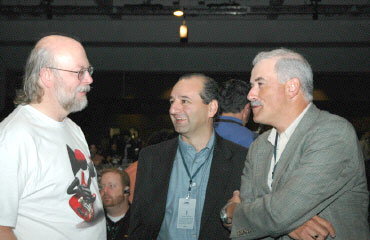IBM and Sun coming to terms on Java and Solaris 10

I knew something was up this morning at JavaOne when I saw Java founder James Gosling schmoozing with Robert LeBlanc, IBM general manager for WebSphere. Also present was Rod Smith, vice president of emerging technologies at IBM and an advocate of open sourcing Java. Indeed, IBM extended its license to use Java technologies through 2016 and announced that all of IBM's middleware software will support Solaris 10 on AMD and Sparc platforms. The endorsement of Solaris 10 was the culmination of an effort by Sun that started in January with a public letter from Sun President and COO Jonathan Schwartz to IBM CEO Sam Palmisano. He basically threw sand in Palmisano's face for withholding Solaris 10 support from large customers.

Sun's James Gosling and Souheil Saliba and IBM's Robert LeBlanc
Sun also announced the beginning stages of open sourcing its Java stack. Sun's Java System Application Server Platform Edition 9.0 as well as the Java System Enterprise Server Bus (Java ESB) will Solaris 10 (1.7 million downloads since January, according to Sun) in the open community world. "This is one step forward as we continue to open-source all of Sun's software assets," said Schwartz. "It's good for business. It's also good for the world."
What's good for business is getting a good share of market by having the best implementations and services associated with deploying open source software in enterprises. In a Q&A at JavaOne, McNealy said that Solaris 10 is faster, better and cheaper than Red Hat Linux. So far, Red Hat doesn't seem to be adversely impacted by open source Solaris 10. McNealy also said that "those who don't join the JBI (Java Business Integration) parade will get left behind." That depends on which parade. The choice of an integration engine, or enterprise service bus, or operating system depends on far more than rhetoric, but for McNealy it's a way to get the dialog going.
I asked LeBlanc whether IBM would open source its application server as Sun has done. He responded that there are "enough open source application servers out there." IBM isn't fanatical about open source--Linux, or Solaris 10, are practical business alternatives to dying breeds of Unix. Don't expect to see open sourcing of DB2, Rational and Tivioli anytime soon, but projects like Eclipse are reflective of how IBM in playing in the open source arena.
I also asked LeBlanc and Souheil Saliba, Sun's vice president of strategic alliances, what kind of horsetrading went into cementing the newfound relationship. They declined to offer any details, but said the negotiation around Java wasn't much different from ten years ago. It's clear that both have different philosophies around the role of open source, but IBM likes the idea of open source Java and having more input into the JCP (Java Community Process). My colleague David Berlind has long believed that IBM has always wanted to gain more 'control' over the evolution of Java from Sun. At the same time, Sun and IBM look at Microsoft (.Net) as a mutual threat to their businesses.
Sun is keeping its enemies closer with its partnerships with IBM and Microsoft, but that doesn't mean that the companies will play nice. But, with open sourcing, and especially open standards, the potential hazards of competing vendors on their customers will be less toxic...
Bonus links: A snippet from Schwartz's JavaOne keynote.
Java at 10 birthday cake and original team members
